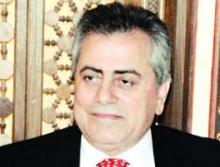 Syrian Ambassador to Lebanon Ali Abdul Karim Ali said on Thursday that “Syria paid dearly to maintain the survival of Lebanon as a united country free of any foreign tutelage,” National News Agency quoted him as saying
Syrian Ambassador to Lebanon Ali Abdul Karim Ali said on Thursday that “Syria paid dearly to maintain the survival of Lebanon as a united country free of any foreign tutelage,” National News Agency quoted him as saying
The Syrian envoy added that “the ‘army, people and Resistance’ formula ( that the Hezbollah led March 8 alliance is calling for ) can protect Lebanon from foreign plans that seek to target its strength and its peoples’ unity.”
Ali also said that Syria has always supported Lebanon’s security and stability, as well as the unity of its people and institutions.
Earlier today and during an interview with the Hezbollah’s website al-Intiqad he urged the Lebanese government to take “serious, strict measures to end arms smuggling from Lebanon into Syria and… not give in to international pressure.”
His comments were made the same day the Higher Defense Council stressed during a meeting at Baabda palace the prevention of arms smuggling and said it asked security agencies to take stronger measures to fight terrorism.
Ali, the first Syrian ambassador to Lebanon, linked the issue of suspected arms smuggling to claims that al-Qaeda was operating along the Lebanese-Syrian border. Lebanon’s Defense Minister Fayez Ghosn as the one who made the claim
“Ghosn’s exposure of al-Qaida members who are infiltrating Syria via the Lebanese border village of Arsal is an issue that must be dealt responsibly and seriously,” Ali was quoted as saying.
“Arms smuggling and terrorism are complementary, and measures to put an end to this matter must be clear and decisive.”
Lebanese Prime Minister Najib Mikati said on Wednesday there is “no solid evidence” that proves the presence of Al-Qaeda terrorist cells in Lebanon.
“Talking about Al-Qaeda presence in the town of Arsal does not mean that it is a reality,” Mikati told reporters, a few days after Defense Minister Fayez Ghosn warned of the existence of such groups.
“We did not receive information of having such organizations,” Mikati said and added “Such a critical issue should not be addressed in a manner that may harm Lebanon.”
Ghosn who is reportedly closely associated with Hezbollah and MP Michel Aoun informed the Lebanese cabinet last Thursday that al-Qaeda members had infiltrated the Bekaa town of Arsal.
President Bashar al-Assad’s regime has blamed Friday’s twin suicide bombing on “terrorist organizations,” including Al-Qaeda, and quoted Lebanese officials as warning Syria that Al-Qaeda members infiltrated into Syria from the town of Arsal.
The Cedar Revolution
One observer commented on Ali’s statement by saying ” the envoy has forgotten the Lebanese history along with the circumstances that led to his presence in Lebanon. Most of all he has forgotten the Cedar Revolution”
The Cedar Revolution or Independence Intifada was a chain of demonstrations in Lebanon triggered by the assassination of the former Lebanese Prime Minister Rafik Hariri on February 14, 2005.
The primary goals of the original activists were the withdrawal of Syrian troops from Lebanon and the replacement of a government heavily influenced by Syrian interests with more independent leadership, the establishment of an international commission to investigate the assassination of Prime Minister Hariri, the resignation of security officials to ensure the success of the plan, and the organization of free parliamentary elections. The demonstrators demanded the end of the Syrian influence in Lebanese politics. At the start of the demonstrations, Syria had been maintaining a force of roughly 14,000 soldiers and intelligence agents in Lebanon. ] Following the demonstrations, the Syrian troops completely withdrew from Lebanon on April 27, 2005. The Pro-Syrian government was also disbanded, accomplishing the main goal of the revolution.

Leave a Reply
You must be logged in to post a comment.